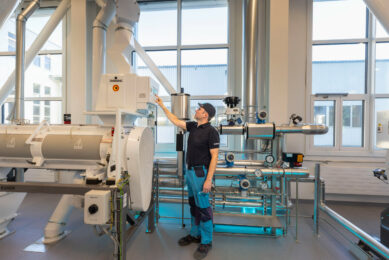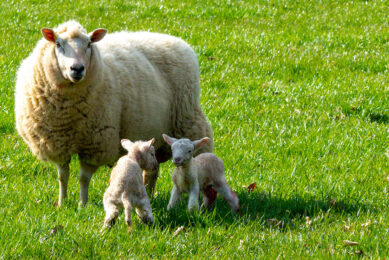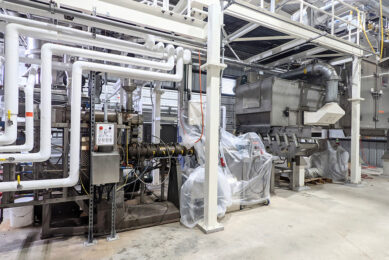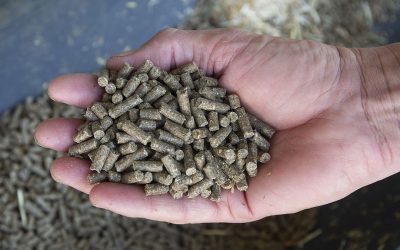Buhler Tijdhof dies & rollers: Same same, but different
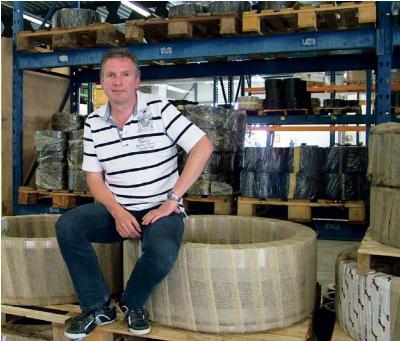
A die is a die is a die. They all look the same, and still are different. Dies and rollers is what Tijdhof Persmatrijzen makes its business of. Recently the family owned company was taken over by Buhler and is now called Buhler Tijdhof. This is reason enough to drive to Oldenzaal, the Netherlands and find out what interested Buhler to purchase the Dutch firm.
A couple of years ago I met Johan Tijdhof and his wife for the first time at the Victam Asia show in Bangkok, Thailand. They were handing out liquorice, a Dutch treat, at their booth, which attracted me. This black sweet is only admired by Dutchies like me and a few foreigners. Besides serving good coffee, they told me about their business and how they supply dies and rollers for pellet presses all over the world. Also, being in Thailand “Same same, but different” is a well known expression, which in the country of imitation clothes and watches means exactly what it is says. “Is this a real Rolex?” “Yes sir, same same but different.” This too can be said for dies. All manufacturers make the same product. The difference is that there is no specific brand to copy, because all dies are tailor-made to the specifications of the buyer and to the fittings of the pellet mill. So, one has to stand out either by making the products cheap – which works negatively on quality – or have other qualities to distinguish themselves from the competition.
Johan Tijdhof claims that one of the qualities of his company was speed of delivery. “This used to be our quality some time ago, but we have become so busy that we run against the maximum capacity of our workshop. With a three-shift working program the delivery time is still eight to nine weeks.” The quality of the die has a crucial impact on its service life – customers attach the utmost importance to its manufacturing quality and precision. Perhaps he could supply at a faster rate, but that would run against his principle of delivering quality materials and flexible production.
Textile industry
It all began a few decades ago when Johan’s father ran a machinery workshop. Based in Oldenzaal, in the east of the Netherlands in the area called ‘Twente’, the textile confection industry was emerging quickly after the 2nd World War. But when that business declined due to competition of cheap-labour countries the machine supplier had to find other outlets to keep his business running. In the early 80’s Tijdhof senior contacted a small company that owned a gun drilling machine to make dies. The sales manager at that company, André Oosterveld, wanted to start up his own business (Persmatrijzen Epe) and bought a few drilling machines and placed them at Tijdhof’s workshop. This way Tijdhof manufactured the dies and managed the workshop, and Oosterveld was his only customer. In the years that followed Tijdhof senior handed over his business to son Johan and when Oosterveld was about to retire, Johan managed to take over the business of Persmatrijzen Epe including the drilling machines.
Today Tijdhof is a real family run operation with Johan, his sister and two more brothers in management, sales and administration. Next to that there are around 20 employees, working in three shifts, manufacturing the dies and rollers. Last year some 2.500 dies were sold and turnover of the business amounted to around €6.5 to €7 million. With the continuous growth of the feed industry and the emergence of biomass pelleting – which basically uses the same pellet mills, but different die hole diameters – the pelleting business grew despite the global financial turmoil. “The recession did not really affect us,” Tijdhof says. Making such specialised wear parts of a pelleting mill business is continuing without many hick-ups. “Only a few years ago when steel was hard to get, we were a bit in trouble,” Tijdhof says. To spread the risk and not be too dependent on one supplier he buys his base material, steel rings, from three different suppliers in Germany. “We also purchased a shipment from China, but delivery times are too long, although the quality is good.”
Dirty and clean
Tijdhof has two workshops, a ‘dirty one’ and a ‘clean one’ as he calls them. The steel rings arrive in the dirty workshop for cleaning and pre-machining, meaning that the outer and inner layer of steel is removed to the specs of the final die. They can process dies with a minimum inner diameter of 300 mm to a maximum outer diameter of 1.300 mm. When a ring is machine ready it is placed in the gun driller. This immediately clarifies why the workshop is called ‘dirty’, because the chisels and drills are cooled with oil and it is inevitable that oil spills end up on the floor and as such stain the floors.
After the holes are drilled – this can take up to 12-13 hours per die – the die moves to a counter driller, which drills the specific outlet hole and a membrane driller, which cleans the holes from leftover chips. After these process steps, the die is moved to the ‘clean’ workshop for final processing. Here the bolt holes are drilled and the die is vacuum hardened in a furnace at about 1,030°C. The last step is a final machining to obtain a perfect die with a smooth surface. Before shipping every die is tested (running in) at an adjustable pellet mill with a feed mixture, then cleaned again and boxed or covered with jute for transport.
Die holes can vary between 1.5 mm (young animal feeds) until 16 mm (biomass, wood pellets) depending on the specifications of the customer and the products that are run in the pellet mill. There is little variance in the number of holes in a ring per die hole size. There is a so-called ‘critical open surface area’ above which wear of the die is too high. More holes in the die means higher capacity, but also faster wear. There is very little to no innovation in the die manufacturing business. “We are experimenting a little with positioning of the holes in the ring, to increase throughput and to save power costs but that should have no name,” Tijdhof says.
Takeover
With a gradual expanding market moments come when, besides regular replacements, new investments have to be made. That is quite a responsibility for a relatively small company, because the machinery used is expensive. Tijdhof was at the eve of that moment, when Swiss feed equipment giant Buhler came by. Effective end of April 2011 the Buhler Technology Group acquired Tijdhof Persmatrijzen and the company is now integrated in the Feed & Biomass business unit (Grain Processing division). The management and employees were retained in the company, and now continue under the Buhler Tijdhof product brand. The acquisition allows Buhler to supply its customers with all the wear and spare parts of a pellet mill from its own single in-house source, including consulting services. Before the takeover Buhler purchased pelleting dies from outside sources.
Tijdhof is pleased with the takeover. “We now have a strong company behind us, which makes decision-making easier. Also some decisions are made by our owner now, which takes some weight off our shoulders,” he says. As an example he mentions the presence at shows all over the world. “Until recently I had to arrange all that by myself, but since we are part of Buhler we can take advantage of its size and global presence. For example, I already made preparations to exhibit at the Latin American Poultry congress in Buenos Aires, Argentina and found a partner to assist me over there, but when he heard about the takeover, he backed off. The initiative, however, was not for nothing, because now we can present ourselves in the booth of Buhler.”
“Before April I had never supplied to Buhler,” Tijdhof says, “but knowing them, they must have found our company a good fit.” He is happy with the takeover. “The takeover gives some rest and security for our family and for our employees. We are going to be Buhler’s European centre for dies and rollers, so I think we have a bright future ahead.”




